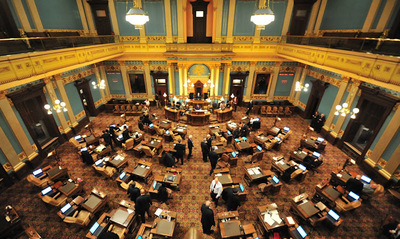The passage of controversial right-to-work legislation by Michigan Republicans left the state heavily divided this past week, but what will happen when the law takes effect?
Robert Boonin, an Ann Arbor-based labor law attorney with the Butzel Long law firm, predicts there'll be more division in workplaces as some employees opt not to pay union dues any longer.
"I think we will see some kind of stigma attached to people who are exercising their newfound right not to pay dues," he said. "The union, of course, has the obligation to represent people whether they're members or not. That aspect of the law hasn't changed and won't change."

The Michigan Legislature's lame duck session saw the passage of many controversial bills, chief among them the state's new right-to-work law.
Ryan J. Stanton | AnnArbor.com
Olson said the unions will need to better communicate with their members what benefits they're providing, and they'll probably have to enhance their transparency to rank-and-file members.
To the extent that unions cannot do that, Olson said, then the exodus of members could be greater with the stigma of non-membership eroding.
"At the local level, I think we won't really see that much of a change on the ground, except perhaps I think the public-sector bargaining units are more vulnerable to people saying they're not interested in paying dues," Boonin said. "Some of the dues are pretty heavy, particularly in the public sector, and I think you'll see more people exercising their right not to pay more in the public sector."
The law, which gives Michigan workers the freedom to choose whether to pay union dues in workplaces that are currently closed shops, is expected to take effect around April 1 and will cover all public and private employees in the state, with the exception of police and firefighters.
It won't affect existing union contracts, only contracts that take effect or are renewed after the law's effective date. Until existing contracts expire, all employees covered in union contracts at workplaces with closed shops must continue to pay union dues.
Once those contracts expire, employees will be free to decide whether to pay dues, but they still will be covered by union-negotiated contracts either way. That's why many organized labor supporters have called right-to-work the "right to freeload" law.
"How do you justify giving somebody a benefit that somebody else fought for?" said Conan Smith, D-Ann Arbor, chairman of the Washtenaw County Board of Commissioners.

Robert Boonin
"Most employees work for employers without a union," he said. "And I think most employers try to be good employers, and most employees just don't need unions. If it weren't for the public sector, you're really only looking at 7 percent of the private sector that's unionized across the country."
Boonin said the practical implications of right-to-work are that the labor movement is going to be weaker, unions will lose members, and Democratic candidates will have less money for their political campaigns. That's not a criticism on his part, he said, just the fact of the matter.
"I think people can pull and twist the statistics in any which way, whether or not this is good for the economy or the state," he said. "I think the use of those economic studies from either side are flawed. At the end of the day, this is a political issue and not a public-policy issue."
Right-to-work, at the very least, means an employee is not forced to choose between supporting a union and accepting a job, Boonin said.
Smith said he's not sure how county employees will react, but he's fairly certain the board of commissioners as a whole stands behind labor organizations in opposing right-to-work.
He said the county's labor unions have willingly and graciously opened up their contracts and made major concessions in recent times to help the county solve its financial problems.
"We don't need right-to-work coming between us and the labor unions with whom we have a really strong working relationship," he said.
A total of 1,048 union-represented county employees paid nearly $455,000 in dues last year, or about $434 on average, according to data provided by the county.
The county has seven collective bargaining units that pay different amounts. For example, AFSCME members paid about $440, while workers represented by the Michigan Nurses Association paid about $550, sheriff's deputies paid about $440 and public defenders paid about $240.
Smith said he hopes the county's unions retain enough members to be able to do good collective bargaining when contracts come up. He said the administration could have the upper hand in negotiations if the unions don't have the resources for legal support and expert analyses.
Tom Crawford, the city of Ann Arbor's chief financial officer, said the city has about 470 employees who have union dues taken directly from their paychecks. Records show the city has eight collective bargaining units whose members paid nearly $250,000 in union dues last year.
That included $123,772 from AFSCME members, $39,840 from police officers, $40,942 from firefighters and $29,748 from Teamsters members, among others.
AFSCME members in the city pay about $500 a year in union dues, while firefighters pay about $530, police officers pay about $480, and Teamsters members pay north of $800.
Over the next two years, most of the city's labor contracts are coming up for negotiation. Crawford said that's one of the city's financial uncertainties going forward.
Gary Wilson, president of AFSCME Local 369, the city's largest collective bargaining unit with nearly 250 members, said he's hoping his union doesn't lose members after right-to-work takes effect, but he said it's too early to speculate what might happen.
"As of right now, I really don't have too much to say about it, because there's a whole lot of information that's floating around that I still need to decipher," he said.
Rick Fitzgerald, a spokesman for the University of Michigan, said U-M has about 11,800 union-represented employees. Information about their dues wasn't immediately available.
Members of the Eastern Michigan University Federation of Teachers, the school's full- and part-time lecturers union, currently pay 1.8 percent of their gross teaching pay in dues.
"People are concerned that this will undermine their ability to have a say in their teaching conditions," EMUFT Staff Organizer Robert Vodicka said of right-to-work.
Boonin said teachers pay some of the highest union dues out there — in some cases, $800 to $900 a year — and they still have had to take concessions in recent years. Given how expensive it is to be in the union, he thinks the Michigan Education Association is particularly vulnerable to losing members.
The MEA is among the groups blasting Gov. Rick Snyder and the Republicans for making Michigan the 24th right-to-work state in the nation. It argues workers in right-to-work states have a lower standard of living, bring home less pay and go without health insurance more frequently.
"That hurts small businesses as consumer spending is reduced, causing a ripple effect that will further hurt Michigan's economy," said MEA President Steve Cook.
Ryan J. Stanton covers government and politics for AnnArbor.com. Reach him at ryanstanton@annarbor.com or 734-623-2529. You also can follow him on Twitter or subscribe to AnnArbor.com's email newsletters.